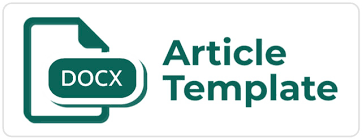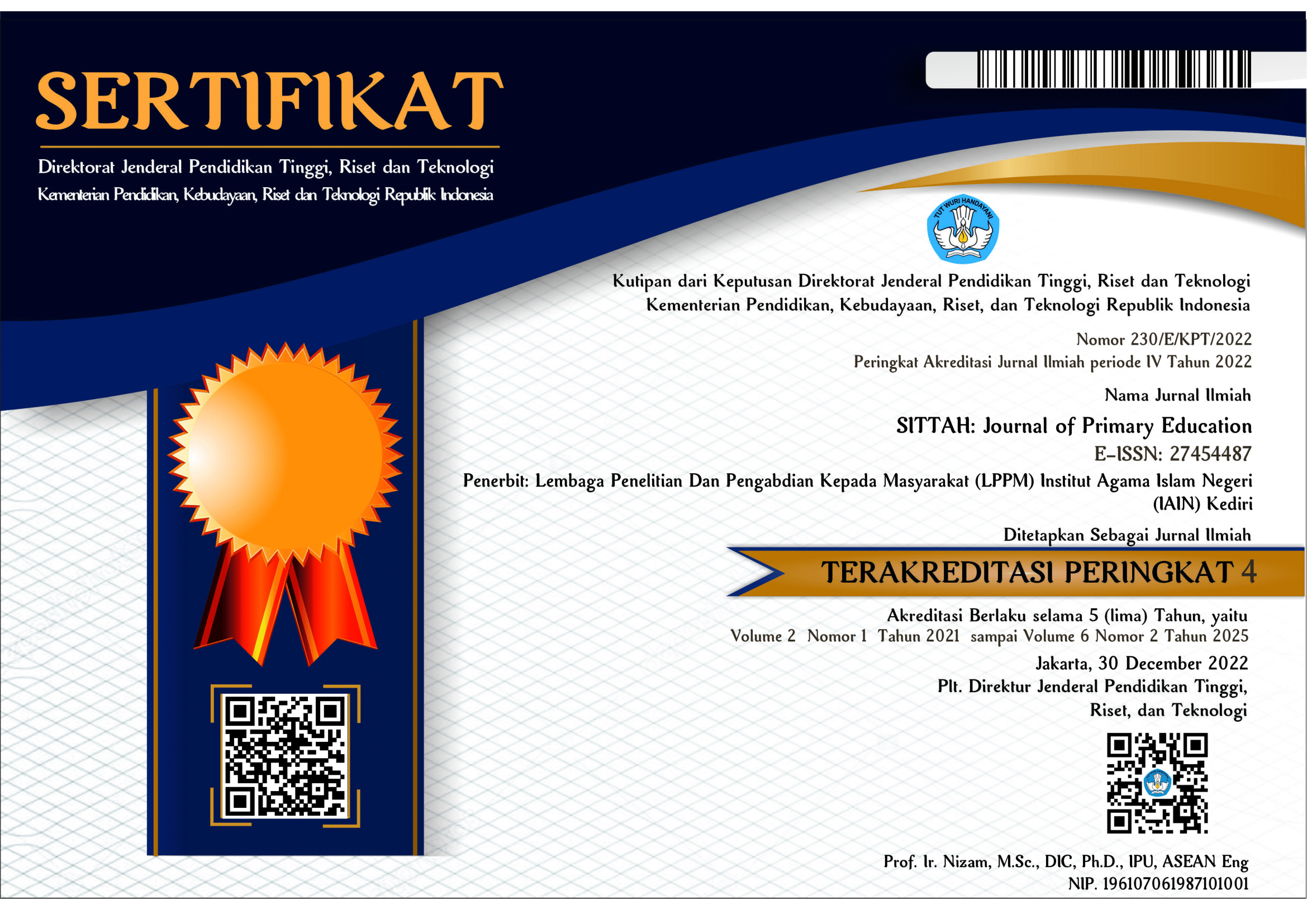PENGARUH MODEL PEMBELAJARAN CONTEXTUAL TEACHING AND LEARNING BERBASIS TPACK TERHADAP HASIL BELAJAR PPKN DI MADRASAH IBTIDAIYAH SWASTA
DOI:
https://doi.org/10.30762/sittah.v3i2.522Keywords:
Civic Education, CTL, Learning Outcomes, TPACKAbstract
The learning outcomes of grade III students in Civic Education (PPKn) subjects are still low. The cause of the low learning outcomes is that the methods used by teachers are still conventional, namely with lecture methods and using single learning resources. Learning also has not utilized technology in the learning process. To improve the results of these students, researchers used the Contextual Teaching and Learning (CTL) learning model. This study uses a quasi-experiment research model with a nonequivalent control group design. The study results concluded that the TPACK-based CTL learning model affects the learning outcomes of PPKn class III. It is evidenced by the results of the t-test conducted by researchers using the SPSS application. In cognitive learning outcomes, a significant value of 0.004 < 0.05 was obtained, based on the conditions of concluding if the significant value < significant level, Ha was accepted, and H0 was rejected. It was concluded that the TPACK-based CTL learning model affects the cognitive learning outcomes of PPKn class III. While in the affective learning outcomes of students, a significant score of 0.049 <0.05 was obtained, it can be concluded that the TPACK-based CTL learning model affects the affective learning outcomes of PPKn class III Madrasah Ibtidaiyah Salafiyah Kranggan
Downloads
References
Amsari, D., Arnawa, I. M., & Yerizon, Y. (2022). Development of a local instructional theory for the sequences and series concept based on contextual teaching and learning. Linguistics and Culture Review, 6(Special Issue on Language, Literature and Linguistics (3L)), 434–449. https://doi.org/10.21744/lingcure.v6nS2.2136
Bas, G., & Senturk, C. (2018). An Evaluation of Technological Pedagogical Content Knowledge (TPACK) of In-Service Teachers: A Study in Turkish Public Schools. International Journal of Educational Technology, 5(2), 46–58.
Dewantara, J. A., Suhendar, I. F., Rosyid, R., & Atmaja, T. S. (2019). Pancasila as Ideology and Characteristics Civic Education in Indonesia. International Journal for Educational and Vocational Studies, 1(5), Article 5. https://doi.org/10.29103/ijevs.v1i5.1617
Fauhah, H. (2021). Analisis Model Pembelajaran Make A Match terhadap Hasil Belajar Siswa Analisis Model Pembelajaran Make A Match terhadap Hasil Belajar Siswa. Jurnal Pendidikan Administras Perkantoran (JPAP), 9(2), 321–334.
Ginting, D., Fahmi, F., Barella, Y., Hasbi, M., Kadnawi, K., Rojabi, A. R., & Zumrudiana, A. (2022). Students’ perception on TPACK practices on online language classes in the midst of pandemic. International Journal of Evaluation and Research in Education (IJERE), 11(4), Article 4. https://doi.org/10.11591/ijere.v11i4.23014
Ibda, H. (2019). Guru Dilarang Mengajar!: Refleksi Kritis Paradigma Didik, Paradigma Ajar, dan Paradigma Belajar. CV. Asna Pustaka.
Ibda, H. (2020). Penguatan Pendidikan Pancasila di Perguruan Tinggi dalam Membangun Generasi Taat Konstitusi. Wahana Akademika, 7(2). https://doi.org/10.21580/wa.v7i2.6528
Ibda, H. (2022). Inovasi Pendidikan dan Pembelajaran Bahasa Indonesia Sekolah Dasar Era Digital (A. G. Wijanarko, Ed.; 1st ed.). CV. Pilar Nusantara.
Ibda, H., Febriani, N. R., Hakim, M. F. A., Faizah, S. N., Wijanarko, A. G., & Qosim, N. (2022). Game innovation: A case study using the Kizzugemu visual novel game with Tyranobuilder software in elementary school. Indonesian Journal of Electrical Engineering and Computer Science, 28(1), Article 1. https://doi.org/10.11591/ijeecs.v28.i1.pp460-469
Indrayadi, T., Kamil, D., Helty, Yusuf, M., Novetra, J., & Sasferi, N. (2020). The Effect of Contextual Teaching and Learning on Reading Motivation (SSRN Scholarly Paper No. 3830276). https://papers.ssrn.com/abstract=3830276
Irwan, I., & Hasnawi, H. (2021). Analisis Model Pembelajaran Contextual Teaching and Learning dalam Meningkatkan Hasil Belajar PPKn di Sekolah Dasar. Edukatif : Jurnal Ilmu Pendidikan, 3(1), Article 1. https://doi.org/10.31004/edukatif.v3i1.343
Johnson, E. B. (2011). CTL (Contextual Teaching & Learning: Menjadikan kegiatan belajar-mengajar mengasyikkan dan bermakna / Elaine B. Johnson; Penyunting: Ida Sitompul. Kaifa.
Juniati, N. W., & Widiana, I. W. (2017). Penerapan Model Pembelajaran Inkuiri Untuk Meningkatkan Hasil Belajar IPA. Jurnal Ilmiah Sekolah Dasar, 1(1), Article 1. https://doi.org/10.23887/jisd.v1i1.10126
Kaur, S. (2019). Role of a Teacher in Student Learning Process. International Journal of Business and Management Invention (IJBMI), 8(12), 41–45.
KSPSTK, S. (2021). Undang-undang Republik Indonesia Nomor 14 Tahun 2005 Tentang Guru dan Dosen. http://p3gtk.kemdikbud.go.id/read-news/undangundang-republik-indonesia-nomor-14-tahun-2005-tentang-guru-dan-dosen
Kustawan, D. (2013). Analisis Hasil Belajar. PT. Luxima Metro Media.
Lago, J. M. L., & Cruz, R. O.-D. (2021). Linking to the real world: Contextual teaching and learning of statistical hypothesis testing. Lumat: International Journal on Math, Science and Technology Education, 9(1), Article 1. https://doi.org/10.31129/lumat.9.1.1571
Lefebvre, S., Samson, G., Gareau, A., & Brouillette, N. (2016). TPACK in Elementary and High School Teachers’ Self-reported Classroom Practices with the Interactive Whiteboard (IWB) | Connaissances abordées dans les pratiques déclarées d’enseignants du primaire et du secondaire qui exploitent le tableau numérique interactif (TNI) en classe. Canadian Journal of Learning and Technology, 42(5), Article 5. https://doi.org/10.21432/T2JK63
Mishra, P., & Koehler, M. J. (2006). Technological Pedagogical Content Knowledge: A new framework for teacher knowledge. Teachers College Record 108 (6), 1017-1054.
Nasihatun, S. (2019). Pendidikan Karakter dalam Perspektif Islam dan Strategi Implementasinya. Andragogi: Jurnal Diklat Teknis Pendidikan dan Keagamaan, 7(2), Article 2. https://doi.org/10.36052/andragogi.v7i2.100
Noviantoro, D. A., Rosdiana, L., Permatasari, D. A., & Aulia, E. V. (2022). The Effect of Contextual Teaching and Learning Model Through Energy in Living Systems Video on Students’ Achievement. Jurnal Penelitian Pendidikan IPA, 7(1), Article 1. https://doi.org/10.26740/jppipa.v7n1.p30-39
Nurhayati, N., Jamaris, J., & Marsidin, S. (2022). Strengthening Pancasila Student Profiles In Independent Learning Curriculum In Elementary School. International Journal Of Humanities Education and Social Sciences (IJHESS), 1(6). https://doi.org/10.55227/ijhess.v1i6.183
Nurhidin, E. (2017). Inovasi Pembelajaran Pendidikan Agama Islam (PAI) Melalui Pemanfaatan Media Pembelajaran Kontekstual Dan Pengembangan Budaya Religius Di Sekolah. Kuttab, 1(1), 1–14. https://doi.org/10.30736/kuttab.v1i1.95
Paneru, D. R. (2018). Information Communication Technologies in Teaching English as a Foreign Language: Analysing EFL Teachers ’ TPACK in Czech Elementary Schools Informacijsko-komunikacijske tehnologije pri poučevanju angleščine kot tujega jezika: Analiza TPACK pri učitelji. 8, 141–163. https://doi.org/10.26529/cepsj.499
Pangemanan, A. (2020). Application of Contextual Teaching and Learning Approach on Statistics Material Against Student Results. International Education Studies, 13(4), Article 4. https://doi.org/10.5539/ies.v13n4p1
Purwanto, A. (2022). The Character Education Based on Pancasila in the Generation Z. Journal of Community Service and Engagement (JOCOSAE), 2(5), 11–16. https://ssrn.com/abstract=4147237
Rafsanjani, M. A., Fitrayati, D., Andriansyah, E. H., Ghofur, M. A., & Prakoso, A. F. (2022). Development of Research Methodology Textbook Based-On Contextual Teaching and Learning. International Journal of Multicultural and Multireligious Understanding, 8(12), Article 12. https://doi.org/10.18415/ijmmu.v8i12.3330
Rahayuningsih, N. T., Ashadi, A. T., & Sarwanto, S. (2013). Pembelajaran Biologi Dengan Model CTL (Contextual Teaching and Learning) Menggunakan Media Animasi dan Media Lingkungan Ditinjau dari Sikap Ilmiah dan Gaya Belajar. INKUIRI: Jurnal Pendidikan IPA, 2(02), Article 02. https://doi.org/10.20961/inkuiri.v2i02.9790
Rahmadi, I. F. (2019). Technological Pedagogical Content Knowledge (TPACK): Kerangka Pengetahuan Guru Abad 21. Jurnal Pendidikan Kewarganegaraan, 6(1), 65–74. http://dx.doi.org/10.32493/jpkn.v6i1.y2019.p65-74
Samudeh, J. M. (2021). Analisis Hasil Belajar Siswa Pada Mata Pelajaran PKN Melalui Metode Pembelajaran Diskusi di SMP Negeri Dedai Tahun Pelajaran 2019/2020. Jurnal Pekan, 6(1), 24–34.
Shoimin, A. (2013). 68 Model Pembelajaran Inovatif dalam Kurikulum 2013 (R. KR, Ed.). Ar-Ruzz Media.
Soleha, F., Akhwani, A., Nafiah, N., & Rahayu, D. W. (2021). Model Pembelajaran Contextual Teaching And Learning untuk Meningkatkan Hasil Belajar Pkn di Sekolah Dasar. Jurnal Basicedu, 5(5), Article 5. https://doi.org/10.31004/basicedu.v5i5.1285
Tanjung, S., Baharuddin, B., Ampera, D., Farihah, F., & Jahidin, I. (2022). Problem Based Learning (PBL) Model with Technological, Pedagogical, and Content Knowledge (TPACK) Approach. International Journal of Education in Mathematics, Science and Technology, 10(3), Article 3. https://doi.org/10.46328/ijemst.2510
Tohri, A., Rasyad, A., Sururuddin, M., & Istiqlal, L. M. (2022). The urgency of Sasak local wisdom-based character education for elementary school in East Lombok, Indonesia. International Journal of Evaluation and Research in Education (IJERE), 11(1), Article 1. https://doi.org/10.11591/ijere.v11i1.21869
Wardhani, N. K. S. K., Mahendradhani, G. A. A. R., & Putra, K. E. (2022). Cultivating elementary school students’ characters through Neo- Humanistic Education. Kasetsart Journal of Social Sciences, 43(2), Article 2.
Yasri. (2018). Dampak Program Pelatihan Teknis Fungsional Guru Terhadap Sikap Sosial Guru Madrasah. Andragogi: Jurnal Diklat Teknis Pendidikan Dan Keagamaan, 6(2). https://doi.org/10.36052/andragogi.v6i2.62
Yildiz, A., & Baltaci, S. (2016). Reflection From The Analytic Geometry Courses Based On Contextual Teaching and Learning Through Geogebra Software. The Online Journal of New Horizons in Education, 6(4), 155–166.
Zhang, Z., Wang, T., Kuang, J., Herold, F., Ludyga, S., Li, J., Hall, D. L., Taylor, A., Healy, S., Yeung, A. S., Kramer, A. F., & Zou, L. (2022). The roles of exercise tolerance and resilience in the effect of physical activity on emotional states among college students. International Journal of Clinical and Health Psychology, 22(3), 100312. https://doi.org/10.1016/j.ijchp.2022.100312
Downloads
Published
How to Cite
Issue
Section
License
Copyright (c) 2022 Amanda Fathin Furroyda, Hamidulloh Ibda, Andrian Gandi Wijanarko

This work is licensed under a Creative Commons Attribution-NonCommercial-ShareAlike 4.0 International License.











